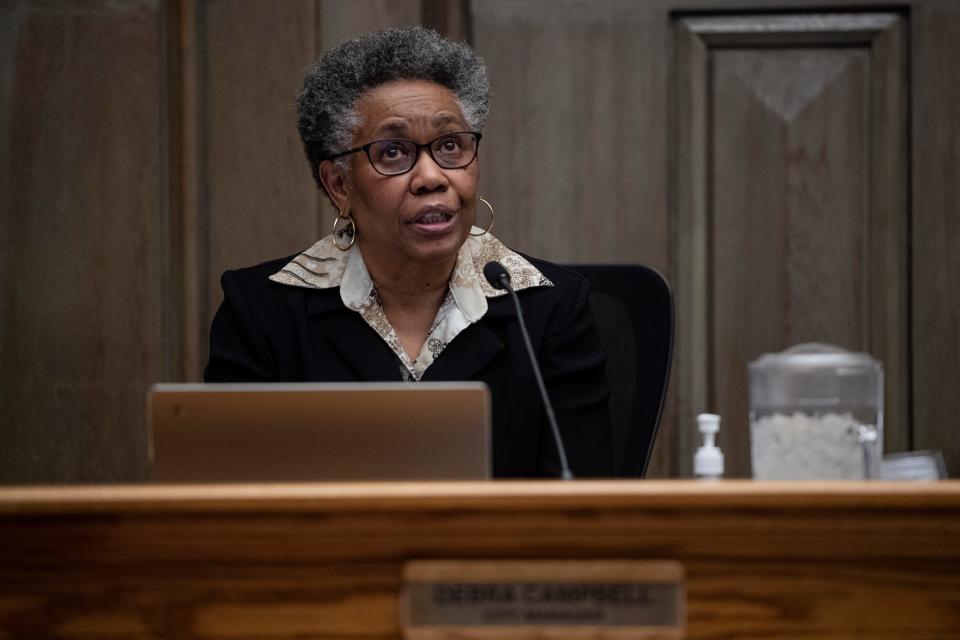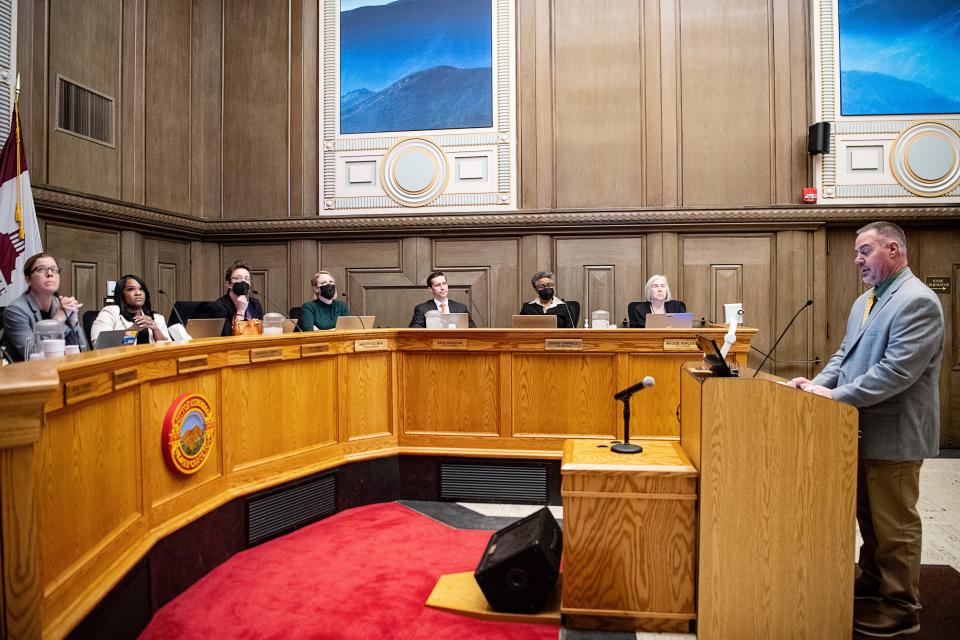Asheville council halts water fee hike; challenges 'deep discount' for commercial users

ASHEVILLE - When proposed with increases to solid waste, stormwater and water utility fees, concerns about an imbalance between fees for residential customers versus commercial and industrial resulted in City Council calling pause — asking staff to revisit the water fee upticks, even possibly putting a freeze on increases for residential single family customers altogether.
Asheville City Council heard a report from staff on proposed changes to utility rates March 28. All told, increases were poised to raise the standard Asheville household bill by $65.36 annually. But hesitation surrounding single family residential water utility rates, which outpace those seen by multi-family residential, commercial and manufacturer customers, delayed any vote on water fees.
Council did unanimously approve the proposed stormwater and solid waste increases, which will result in $1.76 and $2 more on bi-monthly bills for the typical household.
In what Finance Director Taylor Floyd called a "continuation of modest increases," will go into effect July 1.
More:Asheville council approves rezoning for Brookstone Baptist Church site on Merrimon
More:Asheville police: Violent crime up across city, property crime down in 2022
How much are single family residences paying?
At the council meeting, once the water rate proposal was heard — which would increase the typical household water bill by $7.12 bi-monthly, $42.78 annually — it was council member Kim Roney who first voiced concerns.
She noted "deep discounts" for commercial and manufacturer customers, which see rates decrease as their water usage increases, a model that is not utilized for single family residential customers.

The current fee for single family residential is $4.77 per centum cubic feet, with a proposed fee increase to $5.21.
For multi-family residential, rates are currently $4.20 per CCF, with a proposed feed increase to $4.58.
Commercial ranges from $4.04 at the lowest usage to $2.51 at the highest. The proposed fee increases are $4.41 and $2.74, respectively.
Similarly, manufacturer use ranges from $4.04 at the lowest usage to $2.29 at the highest. The proposed fee increases are $4.41 and $2.50, respectively.
More:Answer Man: How does water get to Asheville customers? (Hint: some crazy-high pressures)
Roney said not only are single family residential customers paying higher rates across the board, commercial and manufacturer customers are incentivized to use more water.
"We set up our community to fail each other," she said.
“It seems like we’re putting the burden of our infrastructure needs, which we need to address, on the full-time residents the most.”
Staff noted that a cost service study of water fees is underway, which will provide an assessment of the rate structure, though any recommended changes to the structure were to be considered for fiscal year 2025.
More:Mars Hill man charged with cyclist hit-and-run homicide, arrested by Asheville police
Council members wondered if they could wait to increase fees until the study results were realized, or increase the other rates, but freeze single family residential in place.
Mayor Esther Manheimer echoed the sentiment, and said one concern is how to tweak the rates to create greater affordability for residential users, while not putting the water budget off kilter, especially with pressing capital, infrastructure and service needs.
“It’s very clear we need to make a transition to relieving the fees charged to residential customers,” Manheimer said.
Of Asheville water system's 60,700 customers, 53,528 are single-family residential customers who are billed for about 2,875,186 CCF of the system's total of 7,662,335.
Commercial customers, representing 4,653 accounts, are the next highest user at 2,560,303 CCF.
Council members referenced a March 23 presentation from Water Resources Director David Melton, which offered a look at volumetric rate structurers used by other systems in the state, and found that while actual customer costs were "highly competitive and affordable," most other peer systems charge a lower initial rate to residential customers and increase rates for higher usage.
Melton said the fee study's results are anticipated for late summer.
More:Chef's tastings, farm tours, a rescue goat named Sundae: a day at Montgomery Sky Farm
Next steps?
Council directed staff to return, be it at the next council meeting or briefing, with further options.
Melton and other staff voiced concerns about any time-pressed, short-term staff work directly duplicating the ongoing rate study.
“We know that our commercial and industrial customers are getting a great deal right now, that’s got to come up," Melton said, but wasn't sure if that work could be done before July, when the new fiscal year begins.

City Manager Debra Campbell said staff will come back to council with a recommendation in coming weeks.
“We hear you all clearly. We understand that you want us to figure out a way to minimize the impact as much as possible on residential rate payers," Campbell said.
Budget Manager Taylor Floyd cautioned that these changes could jeopardize some of the planned service enhancements, in addition to other budget items.
Despite a delay on changes to water utility fees, let's take a closer look at the other increases.
More:Answer Woman: What is the history of the sanitariums in Asheville? Why so many?
More:With projects planned for Enka and Woodfin, what's next for Buncombe County greenways?
Stormwater Utility Fee
Changes for the typical household:
$1.76 bi-monthly increase
$10.58 annual increase
According to the staff report, the utility fee is the main source of revenue for the stormwater fund. Fees were not increased in fiscal year 2021 or 2022, and as a result, a 15% increase was approved for fiscal year 2023, and again for fiscal year 2024. It is anticipated to generate $1 million in additional revenue.
For the typical single family household, this year's increase would raise the utility fee by 88 cents, from $5.87 per month to $6.75.
Planned service enhancements:
Additional maintenance crew.
Additional staffing to enhance inspections of constructed stormwater devices.
System mapping to improve asset management.
Vehicle and equipment purchases.
Solid Waste or sanitation services
Changes for the typical household:
$2 bi-monthly increase
$12 annual increase
Prior to fiscal year 2023, the last sanitation or solid waste fee increase was in fiscal year 2017. The fiscal year 2023 increase was $2 per month, and the new increase will rise it $1 more, what will generate approximately $409,000 in additional revenue.
The increase will take the monthly fee per household from $16 to $17.
Planned service enhancements:
Solid waste master plan.
Additional staffing to support increased number of collection points.
30-day update from the water independent review committee
While increases for water, stormwater and solid waste are billed as "typical," some residents may be looking closer at the changes this year, particularly in the wake of unprecedented holiday outages that impacted thousands and left some without water for days at a time.

Asheville resident Bryan Sklar, who spoke with the Citizen Times March 28, said fee increases paired with lingering issues from the outages could feel like "adding salt in the wound."
Though the increases were planned before the crisis, he said “like any other city, you’ve got to temper this. If you’re doing that, give us something back.”
For Sklar, water outages are still top of mind — his home was among those impacted by a March 26 Merrimon Avenue main line break, and though water is back on, and crews were quick to respond, he said water remains cloudy.
City spokesperson Kim Miller said brief service interruptions or breaks in high pressure water systems such as Asheville are, unfortunately, a common occurrence in aging water infrastructure.
According to the staff report, more than covering the usual year-over-year cost increases, the proposed fees for the water resources fund are intended to include funding for a number of operational improvements that, while planned before the December 2022 outage, "are imperative to improving operations and avoiding similar outages in the future."
Jade Dundas, Capital Projects Director, provided an update March 28 on the water outage independent review committee, a nine-person body ultimately responsible for analyzing the events and circumstances that led to the holiday outages.
More:Water outages: Asheville chose to cut off the south from water; Melton made the call
City Council unanimously approved the creation of the committee Jan. 10, and meetings began Feb. 20.
Dundas said the the committee is making good progress and should be on track to meet the 90 day timeline for delivery of its final report.
The nine members vary from water subject matter experts to communication and emergency management experts, and residents and business owners impacted by the outages.
Members are principally doing work in three subcommittees: communications, water system and emergency response and operations. A council presentation on the report is tentatively scheduled for early June, with the report delivery May 30.
Residents like Sklar said he hopes the committee will be able to address many of the lingering issues that surround city water outages, namely communication, which he said was under-utilized in this most recent instance.
“They've got to do better, they can do better," he said of the city. "They have the tools to do it.”
Sarah Honosky is the city government reporter for the Asheville Citizen Times, part of the USA TODAY Network. News Tips? Email shonosky@citizentimes.com or message on Twitter at @slhonosky. Please support local, daily journalism with a subscription to the Citizen Times.
This article originally appeared on Asheville Citizen Times: Asheville Council OKs some fee increases; halts water rate hikes

